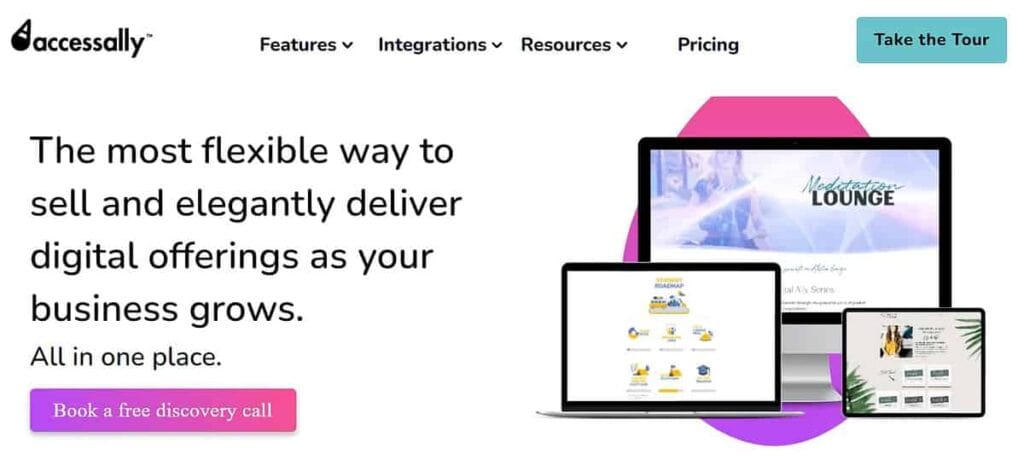Have you ever found yourself constantly doling out advice to friends and family on a particular topic? Are you the Wikipedia in your circle for all things?
Well, fellow edupreneur, it’s time to turn that knowledge into cash.
Selling your expertise online has become a lucrative way for individuals to supplement their income, and it’s not just for big-time gurus.
Whether you’re a business owner, corporate trainer, or even a digital marketer, there’s a market for your knowledge.
In this article, we’ll show you how to turn your know-how into a thriving side hustle and explore how AccessAlly can help you create and sell online courses like a pro.
Let’s get started!
What is knowledge commerce (and is it the right side hustle for you)?
Knowledge commerce is an exciting new way to leverage your expertise to create products or services that people are willing to pay for.
Essentially, it’s the process of turning your knowledge into a viable business that can supplement your income.


But is knowledge commerce the right side hustle for you?
That depends on a few factors. Here are a few questions you need to ask yourself to find out.
- Do you have expertise in a particular subject or skill that people are interested in learning about? This could be anything from yoga to digital marketing to baking. As long as you have a deep understanding of the subject matter and can communicate it effectively, you’re off to a good start.
- Are you comfortable creating content? Depending on what type of knowledge product or service you’re creating, you may need to write blog posts, record videos, conduct seminars and webinars, or even create a podcast. If you’re not comfortable with any of these media, it may be harder for you to create content that resonates with your audience.
- Are you willing to invest time and effort into creating your product and marketing it to potential customers? Building a successful knowledge commerce business takes time and effort, and you’ll need to be willing to put in the work to create in-depth, high-quality content and promote it effectively.
- Do you have a passion for teaching and helping others? If you’re just in it for the money, you may find it harder to stay motivated and create content that truly helps your customers. On the other hand, if you genuinely enjoy teaching and helping others, you’ll likely find the process much more rewarding.
If your answer to all of these questions is ‘Yes!’, consider whether the topic you’re choosing is something you can see yourself talking about for at least 5 to 10 years.
When you are building your own business, you’ll need to be able to sustain your enthusiasm and interest in the subject matter over the long haul.
The bottom line is, if you can communicate your expertise effectively and are willing to invest time and effort into creating a high-quality course, knowledge commerce could be the perfect side hustle for you.
Benefits of selling your knowledge as a side hustle


Selling your knowledge as a side hustle can be a game-changer for anyone looking to supplement their income.
Here are some of the benefits:
It’s a great way to earn extra income
You can create multiple revenue streams offering access to your expertise in various ways, such as selling online courses, coaching services, or launching a membership site. Depending on the topic and the size of your audience, the potential for passive income can be significant.
Knowledge commerce offers flexibility
As a knowledge seller, you have the freedom to set your own schedule and work from anywhere in the world. This makes it an ideal side hustle for those with other commitments, such as full-time work or family responsibilities.
Plus, you can work on your knowledge formats whenever you have spare time!
Startup costs are typically low
Compared to other online businesses, all you need is your expertise, a computer, and an internet connection.
You can use free tools and software to create your knowledge product, such as WordPress and Google Drive, to keep costs low.
Sharing your knowledge can be personally fulfilling
When you start your own digital self-publishing venture, you get to help others achieve their goals and improve their lives. This can be an incredibly rewarding experience, and knowing that you’re making a positive impact on others can provide a real sense of purpose.
Knowledge commerce is scalable
Once you create your knowledge product, you can sell it to an unlimited number of people without incurring additional costs or effort. This means that as your audience grows, so does your potential for earnings.
Now that you know about the many benefits of selling your knowledge as a side hustle, let’s take a look at what you need to do if you are keen on leveraging your expertise and turning your passion for knowledge-sharing into a successful and rewarding part-time hustle.
You Might Change Your Mind About What Features You Want, so You Need a Platform That’s Flexible.
Get your own free demo sandbox account so you can experience the flexibility AccessAlly has to offer.
 See it in action
See it in actionGetting started selling your knowledge as a side hustle
The global gig economy is expected to have a value of $455 billion, by the end of 2023. 50% of millennials and 70% of Gen-Zs have a side hustle.
From these stats, it’s clear that there’s a lot of competition out there.
If you want to turn your passion for knowledge-sharing into a profitable side hustle, it’s important to choose the right offering and plan meticulously.
Here is a step-by-step plan that can help you build a strong, successful setup for becoming an entrepreneur and earning money online.
1. Identify your expertise
Before you can start selling your knowledge, you need to identify what specific expertise you’ll be sharing with the world, so you can create educational content that solves problems for your subscribers and helps them achieve their goals.
How do you identify your expertise?
Start by thinking about your hobbies and interests.
- Do you have a particular passion or skill that you could teach others about?
- How much experience do you have in your chosen area of expertise?
- Are you an expert in a specific field, or do you have general knowledge that could benefit others?
For instance, if you’re a digital marketer or blogger with years of experience, you could create an advanced course for other marketers looking to take their skills to the next level.
Or, if you’re a beginner at coding, you could create a course that teaches the basics to those just starting out.
Consider your target audience. Do you want to sell knowledge to a beginner or someone who wants to take their skills to the next level? This will impact the type of content you create and how you market it.
If you’re struggling to identify your expertise, ask for feedback from friends, family, or colleagues. They may be able to provide insight into what you’re good at and what others may be interested in learning from you.
2. Identify your offering
There are three main options to choose from when it comes to deciding your type of offering.
- Online courses
- Online coaching
- Paid communities
Each option has its own unique advantages and disadvantages, so it’s important to consider your goals, audience, and expertise when making your decision.
Online courses
Online courses provide a structured learning experience for your audience, and you can charge a premium price for access to your expertise. When creating an online course, be sure to choose a topic that is in demand and fills a gap in the market.
Use engaging and interactive materials like videos, quizzes, and exercises to make the course more appealing and effective.
Online coaching
Coaching allows you to work one-on-one with clients and provide personalized support and guidance. Coaching sessions can be conducted over the phone, via video chat, or in person, and you can charge a premium price for your time and expertise.
When offering coaching services, it’s important to establish clear goals and expectations with your clients and to provide them with actionable steps to achieve their desired outcomes.
Paid communities
These communities offer a space for like-minded individuals to come together and learn from each other and from experts in the field.
You can charge a monthly or yearly fee for access to the community, and provide members with exclusive content, events, and resources.
When creating a paid community, it’s important to foster a sense of togetherness and provide value to your members through engaging discussions, events, and expert-led sessions.
While ebooks, podcasts, and paid newsletters can also be effective ways to sell knowledge, they have the downside of being freely available elsewhere. If you want to generate a consistent stream of income, we recommend choosing one or a combination of the above three options.
3. Choose your pricing
Getting your pricing right is a key part of being successful at a side hustle.
Find the sweet spot where you’re charging a fair price for your expertise while also making it accessible for your target audience.
How do you determine the right price point?
- Do your market research. Look at what others are charging for similar services to get an idea of what the market is willing to pay. This will give you a starting point for your own pricing strategy.
- Identify what value you’re providing to your customers. Will your knowledge save them time, help them make more money, or improve their skills? Understanding the value you’re providing can help you determine a price point that reflects that value and justifies the cost to your audience.
- Factor in your expertise and experience. If you have many years of experience in a particular field, your knowledge may be worth more than someone who is just starting out.
- Estimate your time and effort. If you are spending a lot of time researching and preparing your content, your price point should reflect that. Remember, you’re not just charging for your knowledge but for the time and effort you put into creating and delivering it.
4. Manage your time
Managing your time effectively enables you to be productive and efficient with your work, and make the most of every moment.
But how do you manage your time when you’re running a side hustle? By staying organized, focused, and on track.
Here are some tips to improve your productivity and manage your time better:
Take smart shortcuts
Putting in time and effort to produce a quality offering is important, but make use of tools that can streamline the process, such as using course templates. This saves you time and allows you to focus on the most important aspects of your side hustle.
Create a schedule that works for you and your clients
This helps you stay organized and ensures you have time to complete all your tasks. One example is scheduling drip-fed content to stay relevant and maintain engagement. Be realistic about how much time you have available and schedule tasks accordingly.
Set priorities
Determine what tasks are most important and prioritize accordingly. This ensures that you’re focusing on the most essential tasks, helping you stay productive and efficient.
Use productivity tools
There are many tools and apps available to help you manage your time, such as calendars, to-do lists, and time trackers. Experiment to find what works best for you and use these tools to help you stay on track.
Minimize distractions
Try to limit distractions, such as social media or email notifications, when you are working on your side hustle. This helps you stay focused and productive, enabling you to get more done in less time.
Delegate tasks
If possible, delegate tasks to others to free up your time. For example, you can hire someone to handle administrative tasks or outsource certain aspects of your side hustle to a third party.
Take breaks
Make sure to take breaks throughout the day to avoid burnout and maintain your energy levels. This helps you stay focused and productive, enabling you to stay on top of your workload and achieve your goals.
5. Choose the right tools to set up your offering and build your brand
With the right tools, you can easily set up your offering and build your brand when starting your knowledge-based side hustle.
Now, there are hundreds of tools available, so it’s important to find the ones that work best for you, depending on the type of knowledge product you create.
Here are some examples of tools that can help you set up and grow your side hustle:
- Learning management systems (LMS): If you’re creating an online course, a powerful, feature-rich LMS, like AccessAlly’s built-in LMS, can help you create, host, and manage your course content.
- Customer relationship management (CRM): This is where you store all your customer data. Some digital learning platforms don’t need one because they store data internally, but many integrate with a CRM to increase learner engagement and retention. Examples include Hubspot, Salesforce, and Infusionsoft.
- Video conferencing software: If you’re starting a coaching or consulting business, video conferencing software, such as Zoom or Whereby, can help you connect with clients remotely.
- Design tools: If you’re creating visual content, such as eBooks or social media graphics, you may want to use design tools, such as Canva or Adobe Creative Cloud.
- Email marketing software: To promote your knowledge products and keep in touch with your email list, you’ll need email marketing software, like Mailchimp, ConvertKit, or ActiveCampaign.
- Social media platforms: Social media can be a powerful digital marketing tool to promote your offering and connect with your audience. Consider using platforms such as Facebook, Instagram, Twitter, or LinkedIn.
- Payment processors: To accept payments for your knowledge products, you’ll need a payment processor like PayPal or Stripe (or a platform that has already integrated them).
- Website builder: Creating a website with a Content Management System like WordPress, Squarespace, or Wix can help you build your brand and promote your offerings.
- Analytics: Robust analytics software, like Fathom Analytics, Google Analytics or Hotjar, can help you track and measure the success of your side hustle.
- Project management software: To help you stay organized and on track, consider using project management software such as Trello or Asana.
Now that you have outlined your plan to set up a successful side hustle, we come to a more actionable question – which eLearning tool should you choose?
Which eLearning tool is best?
While the choice of eLearning tools depends on your individual course creation and management needs, there are a few platforms that stand out from the crowd.
One of the best eLearning platforms in the market today is AccessAlly.


AccessAlly is an all-in-one eLearning solution that can help entrepreneurs to scale their side hustle businesses.
It is a powerful tool that allows you to sell knowledge online in the form of online courses, recurring memberships, coaching programs, communities, and group training. With AccessAlly, you can create, manage, promote, and sell your knowledge in a way that is both efficient and effective.
Let’s take a look at some of the best features of AccessAlly.
Flexible course builder
AccessAlly has a powerful course builder which allows you to design courses and course materials with any number of modules, lessons, quizzes, and more.
Whether you’re looking to create a short course or a more extensive program, the course builder gives you the flexibility to do so.
You can also choose to offer live or dripped courses, unlock modules based on progress or a set schedule, and enable progress tracking so that your students can see their progress and resume where they left off.
Secure eCommerce functionality
AccessAlly also offers a range of eCommerce tools to help you sell your offering.
Its conversion-focused order forms make it easy to sell your courses, coaching programs, and memberships with just a few clicks.
You can also set up recurring payments with Stripe and PayPal, offer free trial periods to win over potential clients, and use 1-click upsells and order bumps to increase sales.
Plus, it is super easy to sell to teams and corporations with its bulk course enrollment feature.
Audience engagement tools
For any side hustler, the most important factor is to be able to keep your audience engaged and invested in your offering.
With AccessAlly, you can use gamification to create a flexible points system and have members unlock bonuses, earn badges, compete on a leadership board, and more.
You can also create community groups for higher retention rates and better course completion rates.
Most importantly, AccessAlly also provides engagement and sales metrics to help you find out where people get stuck and spot retention trends.
Take a look at this case study, where Shannon Matern was able to generate $36,500 from her online courses within her membership site, after switching to AccessAlly.
AccessAlly’s user-friendly interface and robust features empowered her to create and manage her courses with ease, while also being able to access all the tools needed to scale her business.
“The AccessAlly team makes it so easy to get started on your membership site. The setup videos are the best setup videos I’ve seen for any plugin.”
Shannon Mattern
Make your side hustle a success
Congratulations! You’ve made it to the end of this tutorial on selling your knowledge online. Hopefully, you’ve gained some valuable insights into how to get started and what tools to use.
Now, if you’re ready to take the next step and turn your expertise into a profitable online business, think about joining forces with AccessAlly, the be-all-end-all eLearning platform that can help you get there.
With its flexible course builder, conversion-focused order forms, and engagement-boosting features, AccessAlly is the best tool to help you create, promote, and sell your online courses, coaching programs, memberships, and more.
Don’t wait any longer to turn your side hustle dreams into a reality.
Get AccessAlly and start building your online learning empire today!


